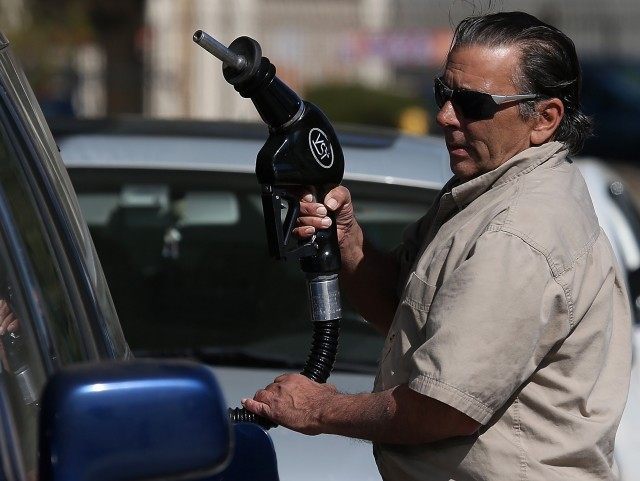GasBuddy started an emergency petition on Friday calling on Governor Brown to obtain an EPA waiver to prevent gasoline price increases of at least 50-cents a gallon in Southern California and 30-cents in Northern California.
As Breitbart News warned in December in “Brown Needs Oil Trains to Prevent Skyrocketing Energy Prices,: decades of anti-oil-production-policies in the Democrat-controlled state had made residents highly reliant on inconsistent supplies of oil from Iraq and oil trains from North Dakota. With supplies now breaking down, Californians are sure to be angry paying $5 a gallon for gasoline.
GasBuddy noted that an “extraordinary convergence of fuel supply problems this week in California prompted severe spikes in wholesale gasoline prices and experts say there’s no immediate relief in sight.” CEO Jason Toews sent Governor Brown a letter asking him to consult with the EPA and Department of Energy about a California gas regulation standards waiver due to “extreme and unusual fuel supply circumstances.” Toews emphasized that such action has been taken in the past, and hoped the Governor would recognize the burden “especially for people struggling to pay the bills.”
Friday’s Gas Buddy call came after U.S. crude oil prices plummeted by -5% last week and the average price of gas in the U.S. slumped to $2.76 per gallon. The International Energy Agency stated that the world is currently “massively oversupplied” with oil, mostly due to the US fracking boom. Over the July 4 weekend, the U.S. national average price for gasoline fell to the lowest level since 2010.
But while the rest of the America enjoys almost $1 per gallon in savings, California drivers on Friday in the Bay Area drivers were surprised to see gasoline up-tick to $4 a gallon, and L.A. Basin drivers were stunned as some stations posted $5 a gallon gasoline.
When Governor Brown was leaving office after his first stint in 1983, California was America’s second-largest producer of crude oil at 1.025 million barrels per day (bpd) 32 years later, California has dropped to the third-largest producer of crude oil, as production plummeted to 545,000 bpd.
Californians are still the second-biggest state consumers of energy, but instead of paying some of the lowest prices for gasoline and electric rates in the nation in 1983, state residents now pay the highest state gasoline prices and the highest retail electric rates, except for Alaska and Hawaii, at 17.35 cents a kilowatt.
The reason California consumers are being hammered on prices is the Democrats’ “Climate Change initiatives,” including Cap-and-Trade (aka “cap and tax”), plus renewable energy subsidies and environmental restrictions.
When Brown signed a bill in 2011 raising the minimum renewable portfolio standards (RPS) for utilities from 20% to 33% by 2020, he promised investments in wind, solar, biomass, and geothermal sources would cut energy prices and create tens of thousands of jobs. The only things stimulated so far have been higher energy prices.
State oil supplies are now at their lowest point in 12-months. Federal energy officials said that California refiners have been forced to run-down 1.1 million barrels held in their reserve storage tanks. Out-of-state crude oil imports had been averaging about 100,000 barrels a day, but no imports arrived last week, according to state records.
In April, Governor Jerry Brown signed an executive order implementing California’s first-ever mandatory water restrictions that required cities and towns to cut their water usage by 25 percent. But realizing the Democrats’ policies were risking a crude oil supply interruption, Brown shocked the state’s powerful environmentalist lobby by completely exempting oil companies in California, allowing them to use of millions of gallons of water for fracking.
Brown’s support for the oil industry contributed to California’s oil production jumping to an 540,000 barrels per day this year, after hitting a 30-year low of 490,000 barrels per day last year. But Brown’s new found love of “black gold” seems to have come too late to prevent $5-a-gallon gasoline in California.

COMMENTS
Please let us know if you're having issues with commenting.